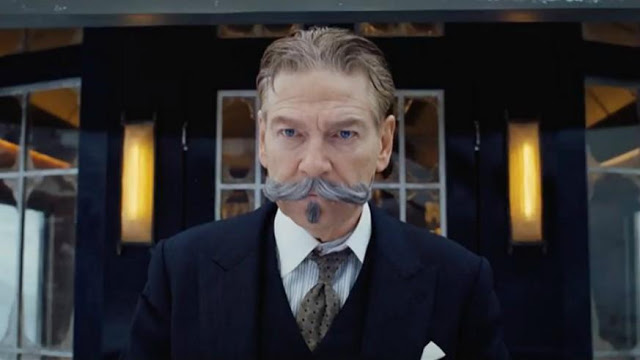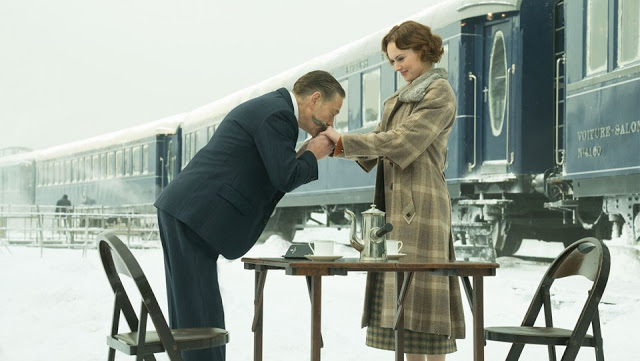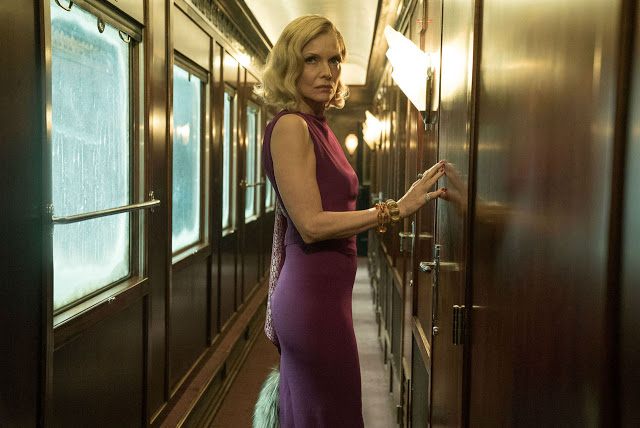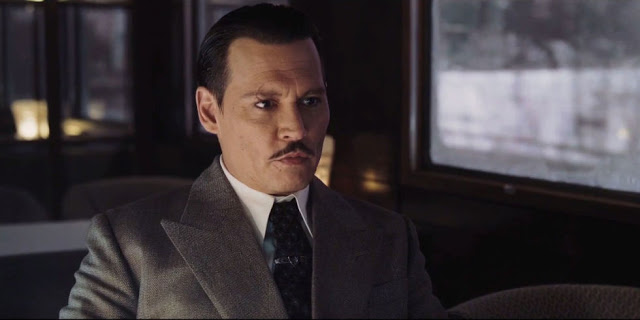The concept of a whodunit set on a train carries with it a tantalizing geometric contradiction. Trains are rigid vehicles, traveling robotically along a designated pathway with no room for deviation or improvisation. Mysteries, by contrast, zig and zag, circling around and doubling back along pronged avenues of key clues, red herrings, and dramatic twists. Murder on the Orient Express, Kenneth Branagh’s sleek but staid transliteration of Agatha Christie’s much-adapted novel, seeks to mine the tension inherent in this incongruity, lumping a dozen-odd suspects and one dead body inside the claustrophobic confines of an immobilized caravan. It’s a suspenseful setting, but it serves as scaffolding for a disappointingly bloodless and familiar story. You know the drill: Everyone is a suspect, nobody can be trusted, and freighted expository flashbacks are just around the bend.
Our conductor on this less-than-thrilling ride is Kenneth Branagh, the stately Irish actor who often moonlights as a mercurial director. (In addition to a number of Shakespeare productions, he has helmed a Marvel movie, a Tom Clancy adventure, and updates of both Frankenstein and Cinderella.) He pulls double duty here, showcasing his knack for filming panoramic vistas while also hamming it up as Hercule Poirot, Christie’s famous and ingenious detective. (Previously essayed on the big screen by both Albert Finney and Peter Ustinov, Poirot is probably most recognizable in the form of David Suchet, who played the sleuth for 24 years on British TV.) Donning a flamboyant Belgian accent and a mesmerizing handlebar mustache that a taxidermist must have pruned from Kurt Russell’s exhumed Hateful Eight corpse, Branagh’s Poirot is a savant who, much like Benedict Cumberbatch’s Sherlock Holmes, is not especially modest about his own intellect. “I am probably the greatest detective in the world,” he declares to a roomful of gobsmacked observers; one suspects he added the adverb as a mere courtesy.
In its early stretches, Murder on the Orient Express threatens to say something interesting about Poirot, attributing his brilliance to an Asperger’s-esque obsession with balance, which in turn allows him to perceive when things are out of place. It’s an intriguing idea that generates some opportunities for wry comedy—when Poirot steps in a pile of shit with one foot, he fussily places his other foot in the same pile, just to even things out—but the movie largely abandons it, reverting instead to traditional gumshoe tropes. Short of repeatedly telling men to straighten their tie, this Poirot is basically your garden-variety cinematic mastermind. Branagh does a lot of brow-furrowing and eye-narrowing, but we mostly accept his character’s brilliance because everyone talks about how brilliant he is.
It’s fair to chastise Branagh for his extreme self-seriousness, but it’s also important to acknowledge his professionalism. His Murder on the Orient Express is a lavish and decidedly impressive production, shot partly in 65-millimeter and gleaming with finely polished décor. Once the titular train embarks, the camera behaves like a roving voyeur, gliding across dining cars and above sleeping compartments with De Palma-like flair. The overqualified cast, decked out in an assortment of wigs and period costumes, briefly turns the movie into a diverting game of spot-the-star. (One of the film’s small but gratifying departures from the novel lies in its demography, changing a few Anglo-Saxon names to allow for increased racial and ethnic diversity.) I recognized most of the Americans easily enough—Johnny Depp as a roguish gangster, Michelle Pfeiffer as a flirty spinster, Josh Gad as a harried assistant—though I confess the identities of Britons Daisy Ridley, Lucy Boynton, and Derek Jacobi (who played Claudius to Branagh’s Hamlet) all eluded me. Spotted or not, most of the actors slip fluidly into their one-note roles—in particular Depp, Ridley, Willem Dafoe as a bigoted crank, and Leslie Odom Jr. as an accomplished doctor—while a few, such as Judi Dench and Penélope Cruz, struggle to lower themselves to material so far beneath their talents.
But this is all window dressing. The meat of Murder on the Orient Express lies in the gradual resolution of its central crime, with puzzle pieces snapping into place and threads tightening into a proverbial noose. And it is here that Branagh’s handling of the material proves strangely clumsy and inert. As Poirot interviews the various suspects, he begins musing about a past incident evocative of the Lindbergh kidnapping, and Branagh peppers the proceedings with lightning-quick black-and-white flashbacks designed to goose our speculation about the passengers’ respective motives. Yet the screenplay, by Michael Green, never satisfactorily connects the disparate dots, and Branagh’s pacing is alternately too patient and too rushed, lurching through the initial investigation before breathlessly trying to deliver a shocking conclusion.
The impact of that shock is relative, and it’s worth acknowledging that this movie will play to two different audiences: those already acquainted with Christie’s devilish ending, and those blessedly ignorant of it. As someone who’s read the novel (albeit more than 20 years ago—I think maybe at some point there was a murder?), perhaps I entered Branagh’s excessively faithful adaptation at a disadvantage, robbed of the possibility of being surprised. But familiarity should not serve as a disqualifier of enjoyment, and in any event, I suspect that even if I’d been entirely unaware of Christie’s sly plotting, I would have left this film less stunned than befuddled. I certainly would have remained bewildered by a pair of would-be action sequences, both of which are frightfully executed and feel woefully out of place in a theoretically taut chamber drama.
“You’re an awfully clever man,” someone tells Poirot near the end of a film that desperately wants to dazzle us with its own cleverness. Yet while Murder on the Orient Express is nicely crafted, it is too sedate to be intellectually stimulating. This makes the grim solemnity of its final act unfold with an irritating snobbery, with Poirot serving as both our unraveler of clues and our moralist-in-chief. He’s smarter than we are, sure, but as he superciliously solves the perfect crime, he acquires a faux righteousness that is difficult to bear. This inflated sense of self-importance extends to and ultimately topples a movie that, its obsessive protagonist would surely shudder to discern, grows helplessly out of balance.
Jeremy Beck is the editor-in-chief of MovieManifesto. He watches more movies and television than he probably should.





I really enjoyed it. Not overwhelming joy-enjoyment, but nonetheless perfectly fine for a Thursday night. I also had the benefit of having never read the book first, so the twists and turns kept me intrigued.
I think you may be a bit too harsh on it!
Fair enough. I'll be interested to hear from more people who haven't read the book and see if there's a split in opinion along those lines.